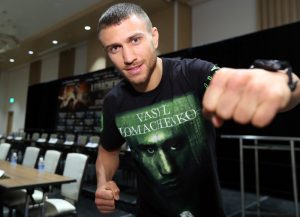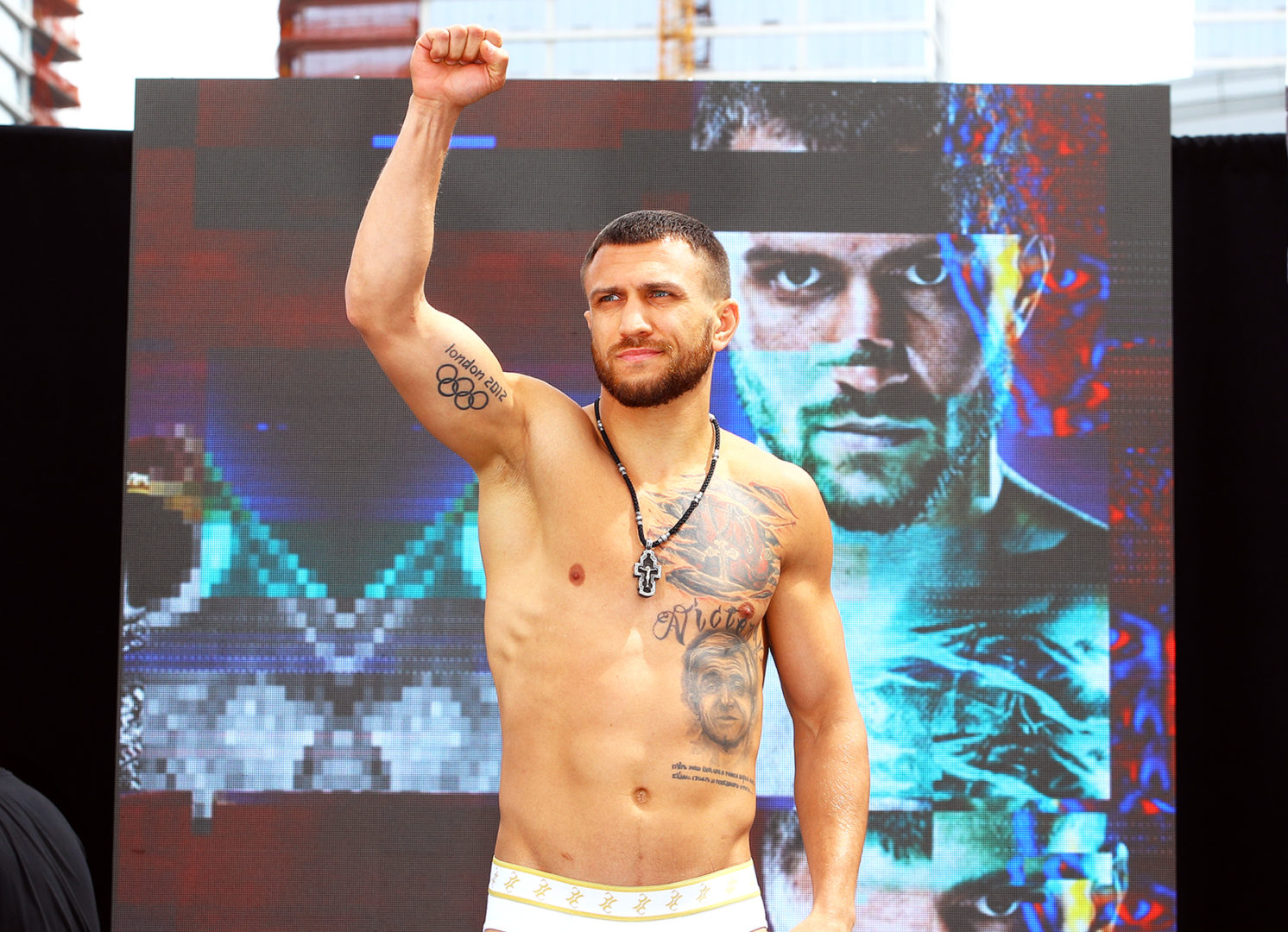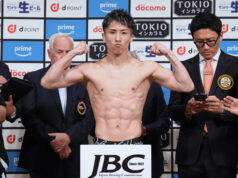By Bart Barry-

Saturday on ESPN Ukrainian super featherweight champion Vasyl “Hi-Tech” Lomachenko made undefeated Cuban super bantamweight champion Guillermo “The Jackal” Rigondeaux quit after six rounds. On HBO Mexican journeyman Miguel “Mickey” Roman beat to a crumple Mexican journeyman and former champion Orlando “Siri” Salido. ESPN’s match comprised two fighters with four Olympic gold medals. HBO’s comprised two fighters with 25 professional losses. While any aficionado might’ve predicted which match would be more entertaining, few of us predicted exactly how much more entertaining Roman-Salido’d be than Lomachenko-Rigondeaux.
Saturday’s mainevents hadn’t a unifying thread that springs to mind but Salido, HBO’s counterprogramming ace, representing the one loss on Lomachenko’s record. It’s a proper loss, too, no matter how a commentator and ring announcer now revise it.
No sooner do we threaten to start a new era in which undefeated ledgers are not all there is to a fighter’s dossier but we try to unblemish Lomachenko’s record retroactively – else we’ll compromise what words like “otherworldly” we now include in the subtitle of his brochure. This straining for symmetry is what happens when we see ourselves as storytellers, not journalists, a point of ongoing and massive struggle for television as a medium.
Television was built on images that flicker to mesmerize and entertain. When this wasn’t enough to grow revenues television endeavored to get serious and journalistic and in a small corner of itself did so successfully enough subgenres got born. But television is too topical to be sober or intellectual as the written word – with its frowzy dressers, doughy faces, hard drinkers and thousandhours spent in front of library stacks instead of mirrors – and television knows this about itself and too knows it’s not glorious or beautiful as cinema or it wouldn’t have to sell its every fifth minute to advertisers. Television is best when it tries to be a little of both, more intellectual than cinema, more fun than print.
Television is frankly awful when it tries to lecture. There were some moments of it Saturday.
Something about Lomachenko, starting with his silly nickname, makes aspiring Homers of every speedreader and street philosopher; the mean feat of making smaller men quit fighting in frustration ascends to the historic when Lomachenko does it. Much of this, again, is his topicality; Lomachenko’s promoter, Bob Arum, knows better than any man alive if you can get your guy in front of a camera against weak opposition television’s salesmanship reliably fills every vacuum in realtime; commentary crews involuntarily enter a hyperbole duel with one another, earnestly wanting to be able to say theirs was the first to perform a historic inventory of this historic figure’s every historic quality. Some writers sometimes do this, too, especially those who hope to make it to television someday, but writing polices its own – as it did for centuries before television’s invention – dealing in credibility more than ratings.
Something about the very nature of words makes it harder to write “Lomachenko may someday be considered greater than Muhammad Ali” than it is to say it.
If there’s some tension between a pursuit of truth and a fun experience, television has to err on the fun side of things, selling the experience in a way print does not: nobody, after all, in 30 years will say he remembers the first time he read about Lomachenko, while plenty of folks now hope to have occasion to say they remember the first time they saw him. There are plenty of smart professionals in television, of course, and after thinking a bit on the proposition they realize the risk to credibility of calling every fighter the next Ali, Marciano or Robinson (or Pernell Whitaker) is dwarfed by the reward of being the first to recognize a future legend.
“Predicting,” as they say, “10 of the next two great champions.”
At the risk of losing a reader or two, I can happily report I found Miguel Roman’s victory multiples more compelling than Lomachenko’s. Wait, get back here, you two; I watched Lomachenko-Rigondeaux live, not Roman-Salido. If I wasn’t nearly first on the Rigondeaux bandwagon I did cover from ringside his sixth, ninth and 10th prizefights and recognized, with the help of a local San Antonio trainer, his multitude of talents. I wasn’t ringside for his defining win against Nonito Donaire (I was at a Natalie Merchant concert in Fort Worth, instead, and do not regret it a little) but was thrilled with the result, annoyed as I was by the hyperbole by then accrued to Donaire.
Since then I’ve been unimpressed by Rigondeaux as the rest of you. But he did do Saturday what we ask prizefighters to do once they’ve declared themselves too-feared to find opponents in their proper weightclasses. And the result was predictable. Fruity as his comportment often is, Lomachenko gives refreshingly honest postfight analyses, and his saying a corner quittage by an undersized man did not rate was my favorite thing Lomachenko did Saturday.
There’s no need to rehash the action because, over and again, it’s awfully easy to look sensational and do outlandish against a man once you know he can’t hurt you, which is why Canelo and GGG made none of the highlights against each other in September they make against smaller men.
Anyway it would be malpractice to commit any more space to that unexceptional and unsatisfying fare after a weekend when Miguel Roman retired Orlando Salido in a gorgeous attritioning of Salido’s noble spirit. Each man planned to retire if he lost, and neither man said so beforehand, which compares most favorably with the lucrative twofight sendoff HBO and Miguel Cotto just threw Miguel Cotto, no?
Roman probably won’t win his next fight without he barefoots another pathway of hot coals, which is fortunate for us and unfortunate for him. After what Roman just did to Salido at 130 pounds, with a different marketing team and promoter and momentum he might otherwise be allowed to make shortfilms about his reflexes and do otherworldly things against a bantamweight.
Bart Barry can be reached via Twitter @bartbarry









